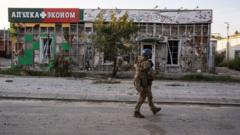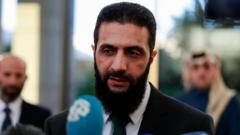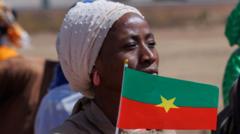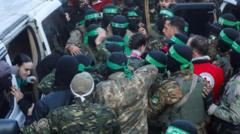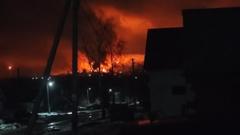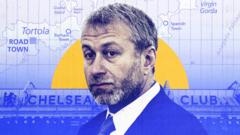As Vladimir Putin marks a quarter-century in power, questions of his commitment to Boris Yeltsin's legacy and the broader implications of his leadership, particularly in relation to the ongoing Ukraine conflict, take center stage.
Has Putin Fulfilled Yeltsin's Mandate After 25 Years in Power?
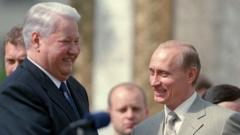
Has Putin Fulfilled Yeltsin's Mandate After 25 Years in Power?
In light of Putin's anniversary, an exploration of his governance and its impact on Russia emerges.
The article text:
On December 31, 1999, a momentous shift occurred in Russian governance – President Boris Yeltsin unexpectedly announced his resignation, transferring power to Prime Minister Vladimir Putin. This event not only marked the beginning of Putin's long tenure but also set the stage for Russia's complex trajectory over the next 25 years. Yeltsin's parting advice to Putin was poignant: "Take care of Russia."
As the ongoing conflict in Ukraine approaches its three-year mark, the reverberations of Putin's past decisions are more pertinent than ever. The war has wreaked havoc on Ukraine, resulting in massive destruction, loss of life, and the displacement of millions. However, the repercussions have also been profound for Russia, with heavy military losses, regular drone attacks on its territory, and a worsening economy exacerbated by international sanctions.
Reflecting on the dramatic changes in Putin’s leadership, one must consider the remarks of those who have observed him closely. Former NATO chief Lord Robertson, who met with Putin during the early 2000s, highlighted the significant transformation in Putin’s approach from a more collaborative figure to one perceived as increasingly megalomaniacal today. This shift raises questions about Putin's aspirations to restore Russia's former glory and his ongoing struggle with feelings of inadequacy in the shadow of past superpower status.
When BBC journalist Steve Rosenberg pressed Putin during a lengthy press conference, the question of whether he has indeed taken care of Russia loomed large. In a bold declaration, Putin asserted satisfaction with his governance, claiming to have pulled Russia back from the brink of catastrophe. He framed Yeltsin’s era as one of diminishing sovereignty, positioning himself as a defender of the nation against perceived Western disrespect.
Yet whether Putin genuinely believes this narrative or is simply attempting to justify the ramifications of his aggressive policies remains ambiguous. This crucial question could shape not only the outcome of the ongoing war but also the future of Russia itself, as it navigates the delicate balance between nationalism and the harsh realities imposed by war and international relations.
As observers watch closely, the ongoing conflict and Putin's reflections on his legacy will inevitably influence the international landscape and Russia's role within it.
On December 31, 1999, a momentous shift occurred in Russian governance – President Boris Yeltsin unexpectedly announced his resignation, transferring power to Prime Minister Vladimir Putin. This event not only marked the beginning of Putin's long tenure but also set the stage for Russia's complex trajectory over the next 25 years. Yeltsin's parting advice to Putin was poignant: "Take care of Russia."
As the ongoing conflict in Ukraine approaches its three-year mark, the reverberations of Putin's past decisions are more pertinent than ever. The war has wreaked havoc on Ukraine, resulting in massive destruction, loss of life, and the displacement of millions. However, the repercussions have also been profound for Russia, with heavy military losses, regular drone attacks on its territory, and a worsening economy exacerbated by international sanctions.
Reflecting on the dramatic changes in Putin’s leadership, one must consider the remarks of those who have observed him closely. Former NATO chief Lord Robertson, who met with Putin during the early 2000s, highlighted the significant transformation in Putin’s approach from a more collaborative figure to one perceived as increasingly megalomaniacal today. This shift raises questions about Putin's aspirations to restore Russia's former glory and his ongoing struggle with feelings of inadequacy in the shadow of past superpower status.
When BBC journalist Steve Rosenberg pressed Putin during a lengthy press conference, the question of whether he has indeed taken care of Russia loomed large. In a bold declaration, Putin asserted satisfaction with his governance, claiming to have pulled Russia back from the brink of catastrophe. He framed Yeltsin’s era as one of diminishing sovereignty, positioning himself as a defender of the nation against perceived Western disrespect.
Yet whether Putin genuinely believes this narrative or is simply attempting to justify the ramifications of his aggressive policies remains ambiguous. This crucial question could shape not only the outcome of the ongoing war but also the future of Russia itself, as it navigates the delicate balance between nationalism and the harsh realities imposed by war and international relations.
As observers watch closely, the ongoing conflict and Putin's reflections on his legacy will inevitably influence the international landscape and Russia's role within it.



